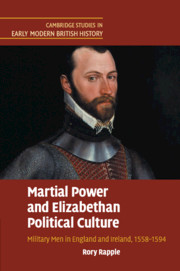Book contents
- Frontmatter
- Contents
- Acknowledgements
- List of abbreviations
- Notes on the text
- Political map of sixteenth-century Ireland circa 1534
- CAMBRIDGE STUDIES IN EARLY MODERN BRITISH HISTORY
- Introduction
- 1 Chimneys in summer
- 2 Martial men and their discontents
- 3 The limits of allegiance: English martial men, Europe and the Elizabethan regime
- 4 The captains and the Irish context
- 5 The limits of imperium: martial men and government
- 6 The limits of rhetoric: the captains and violence in Elizabethan Ireland to 1588
- 7 Unlimited indemnity: delegates versus viceroys
- Conclusion
- Bibliography
- Index
1 - Chimneys in summer
Published online by Cambridge University Press: 02 July 2009
- Frontmatter
- Contents
- Acknowledgements
- List of abbreviations
- Notes on the text
- Political map of sixteenth-century Ireland circa 1534
- CAMBRIDGE STUDIES IN EARLY MODERN BRITISH HISTORY
- Introduction
- 1 Chimneys in summer
- 2 Martial men and their discontents
- 3 The limits of allegiance: English martial men, Europe and the Elizabethan regime
- 4 The captains and the Irish context
- 5 The limits of imperium: martial men and government
- 6 The limits of rhetoric: the captains and violence in Elizabethan Ireland to 1588
- 7 Unlimited indemnity: delegates versus viceroys
- Conclusion
- Bibliography
- Index
Summary
Harry Monmouth, being in his right wits and his good judgements, turned away the fat knight with the great belly-doublet; he was full of jests, and gipes and knaveries, and mocks; I have forgot his name.
Henry V, Act IV, Scene 7In 1584, Sir William Cecil, Baron Burghley, wrote his son Robert a letter containing ten common-sense precepts for ordering his life. The advice was blunt – especially where he advised his hunchbacked son not to marry a dwarf for fear he might ‘beget a race of pygmies’ – and betrayed much about Cecil's prejudices. ‘Suffer not thy sons to pass the Alps’, he intoned ‘for they shall learn nothing but pride, blasphemy, and atheism’ he was also eager to add ‘neither … shalt thou train them up to wars’. Here he was unequivocal. To train a son for war was hazardous because
he that sets up his rest only to live by that profession can hardly be an honest man or a good Christian, for war is of itself unjust unless the good cause may make it just. Besides it is a science no longer in request than [its] use for 'soldiers in peace are like chimneys in summer.
To Burghley's mind, soldiering and the life of virtue were incompatible, and martial men were quick to grow rotten once their season had elapsed.
- Type
- Chapter
- Information
- Martial Power and Elizabethan Political CultureMilitary Men in England and Ireland, 1558–1594, pp. 19 - 50Publisher: Cambridge University PressPrint publication year: 2009

